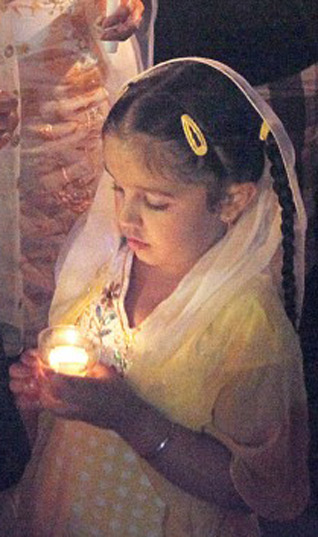After a white supremacist opened fire at a Sikh gurdwara in Oak Creek, Wisconsin, USA, this past August, significant media resources have been devoted to describing, analyzing, and attempting to explain the event. A few of the prominent themes have included buzzwords such as "unprecedented," "victimization," and "suffering" endured by Sikhs in America.
Although these buzzwords rightfully point to the challenges faced by Sikh Americans, they fail to aptly capture the spirit and attitude with which Sikhs have embraced such challenges throughout history.
Traditionally the Sikh community does not lament periods of persecution and hardship, but instead, celebrates the contributions and sacrifices made by the community members and greater society living within those moments.
History offers a broad perspective for viewing this unique approach, and one instructive example is that of Bhai Mani Singh (d. 1737 CE), a prominent leader of the Sikh community in the early 18th century.
After a brief moment of political success in the early 18th century, the Sikhs quickly became targets of persecution. The ruling elite of India literally placed a price on the head of every Sikh, and official policies made it difficult (or from time to time, illegal) for Sikhs to assemble in public settings. Political oppression was particularly high in the 1730s when Bhai Mani Singh petitioned Governor Zakariya Khan to allow the Sikhs to gather in Amritsar for the purpose of community-building, social gathering, and decision-making. Khan agreed to the request with the stipulation that the Sikhs would pay the state a hefty tax in return.
Traditions recount that state authorities planned to let the Sikhs gather in Amritsar before unleashing a military strike that would decimate the community. Fortunately, Bhai Mani Singh caught wind of this plan and called off the gathering. In response to the state's fear-mongering and its oppressive practices, Bhai Mani Singh decided to make a statement. He publicly called out the government for reneging on its agreement and therefore refused to pay the taxes.
The state responded with a statement of its own. After arresting him, the authorities transported this community leader to Lahore and ordered that he be publicly executed in a most gruesome manner - dismembered, joint-by-joint. Traditions recount that the executioner sympathized with Bhai Mani Singh's plight and planned to spare him the torture by dismembering him limb by limb instead. However, Bhai Mani Singh looked up at his executioner and announced: "You don't need to feel sorry for me. Follow your orders and start the execution at my finger joints rather than my limbs."
To this day Sikhs do not grieve Bhai Mani Singh as a victim of oppression, but instead, they celebrate his contribution to the community and remember the price he paid in standing up for justice with the regularly repeated words: "bundh bundh kuttae (dismembered, joint-by-joint)."
The account of Bhai Mani Singh demonstrates the Sikh commitment to battle oppression, and his memory illustrates the Sikh spirit of celebrating those who have made sacrifices to stand against injustice. Sikhs do not remember him as a helpless victim, but as a heroic activist.
The recent narrative of Sikhs in America as victims is overly simplistic and incongruent with Sikh traditions.
It is time for us to revisit this victimization narrative and account for the Sikh spirit of chardi kala (perpetual optimism). This approach will help us better understand perspectives of the Sikh community, from the celebratory memories of Bhai Mani Singh to the positive responses following the hate-inspired massacre in Oak Creek.
Simran Jeet Singh is a doctoral candidate in religion at Columbia University.
[Courtesy: Journal Sentinel]
December 26, 2012




